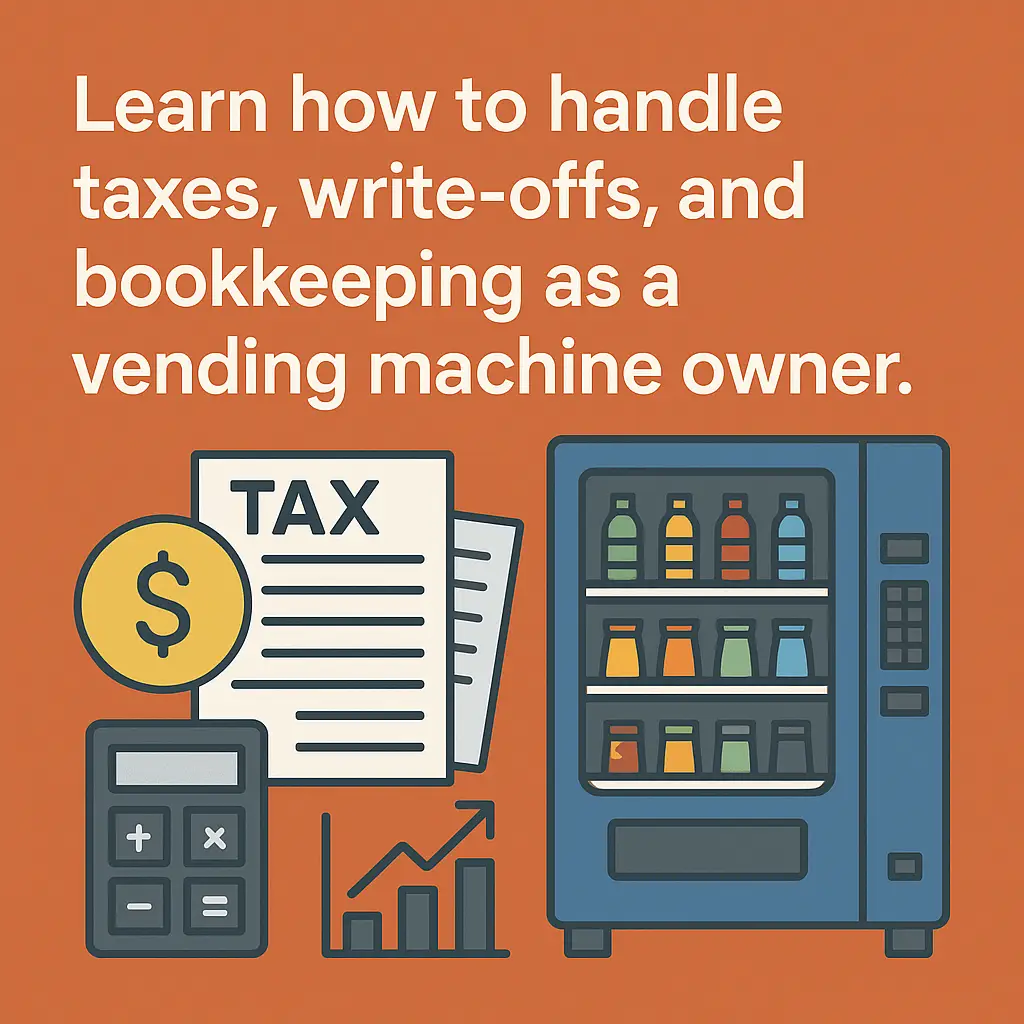Vending Business Taxes and Deductions
Learn how to handle taxes, write-offs, and bookkeeping as a vending machine owner.
Back to Vending Business Startup ResourcesLearn how to handle taxes, write-offs, and bookkeeping as a vending machine owner.
Back to Vending Business Startup ResourcesStart your 30-day free trial and get instant SMS and email alerts whenever a local business needs vending service. These are real location leads to help you grow your route — you decide which ones to buy, no obligations or contracts.
![]() Track inventory costs to claim accurate product deductions
Track inventory costs to claim accurate product deductions
![]() Mileage and vehicle use may be a valid tax write-off
Mileage and vehicle use may be a valid tax write-off
![]() Using accounting software improves bookkeeping accuracy
Using accounting software improves bookkeeping accuracy
30 days free, then $39 / month.
No Commitment. Cancel Anytime.

Running a vending business means handling more than just machines—you also need to stay on top of your tax responsibilities. Understanding which costs can be deducted and maintaining clean financial records can significantly improve your bottom line during tax season.
Start with proper business classification. Most vending operators file as sole proprietors, LLCs, or S corps. Each has its own tax rules, so it’s worth consulting a tax professional to choose what fits. You should also maintain a dedicated business bank account to prevent mixing personal and business finances.
Many everyday expenses in the vending world are tax-deductible. These can include machine purchases, product inventory, service repairs, storage rental, and even mileage for traveling to refill locations. For example, if you drive to several sites daily, tracking your business miles can allow deductions using the IRS standard mileage rate. Just keep a detailed log to back it up.
Other common deductions include insurance premiums, accounting software like QuickBooks, and marketing efforts such as website hosting or business cards. If you hire employees or contractors, their wages and benefits are also write-offs, as long as records are accurate and payments are documented.
One of the biggest mistakes operators make is lacking organized bookkeeping. Relying solely on machine cash totals or guessing expenses at year-end can lead to costly audits or missed deductions. Consider using a software tool that tracks all income and expenses throughout the year. That includes cash sales, mobile payments, and any commissions paid to property owners.
It’s also wise to set aside tax payments quarterly, especially if you're operating as a sole proprietor without employer withholding. Estimated payments reduce penalties and help manage cash flow throughout the year.
For tips beyond accounting, check out strategies on landing your next vending location and renegotiating site agreements to improve profitability.
Vending Exchange connects vending operators with real businesses actively looking for vending services—including traditional machines, AI coolers, and office coffee. Get instant SMS and email alerts when new opportunities are available in your area. No contracts or monthly fees—just buy the leads you want. Start your free 30-day trial today and grow your vending business on your terms.
Most vending operators file as sole proprietors or LLCs. You'll report income on Schedule C and track all deductions throughout the year. A tax professional can help identify the best tax filing structure for your setup.
Common deductions include vending machines, product inventory, vehicle mileage, repair services, insurance, accounting software, and marketing. Just be sure to keep detailed records for all write-offs.
Yes, using a dedicated account helps separate personal and business finances, which improves organization, simplifies tax filing, and makes audits easier to handle.
Yes, you can deduct business-related mileage using the IRS standard rate. Maintain a mileage log documenting each trip and its purpose to validate your claim.
Use a ledger, notebook, or accounting software to log cash collected from machines. Include date, location, and amount to keep your financial records accurate and audit-ready.
Yes, machine purchases are capital expenditures and can be deducted through depreciation. In some cases, Section 179 lets you write off the full cost in one year.
Use accounting software like QuickBooks or Wave. It helps track income, expenses, and generates reports for taxes. Spreadsheets are a simple alternative for smaller operations.
Yes, if you operate as a sole proprietor or LLC without tax withholding. This prevents penalties and helps smooth out tax payments across the year.
Yes, if the storage is used solely for holding inventory or equipment, it qualifies as a business expense and can be written off.
Yes, commission or rental payments to property owners are deductible business expenses. Keep documentation of each payment and the associated terms.